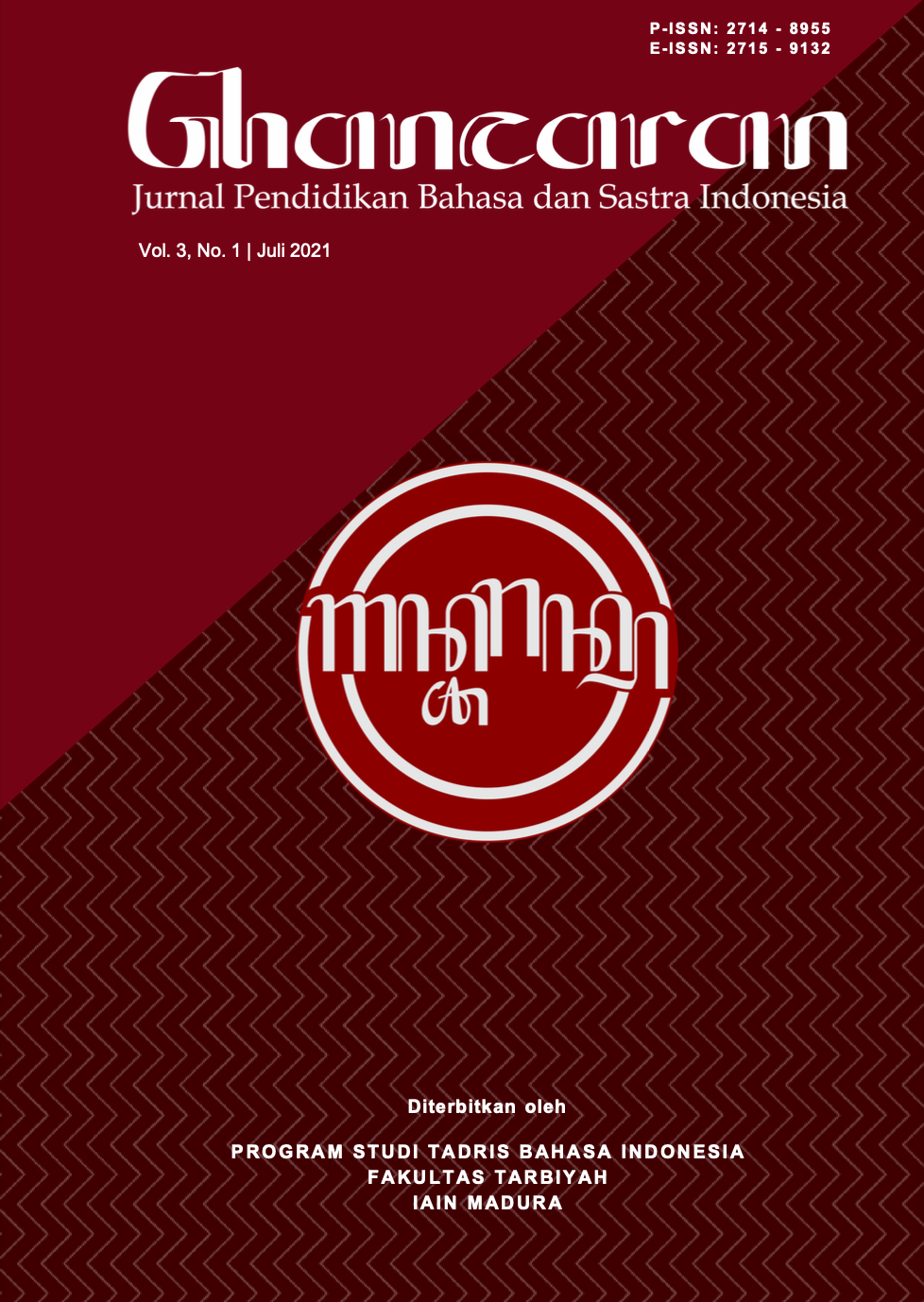Penggunaan Kalimat Efektif dalam Tugas Karya Ilmiah Mahasiswa D-3 Politeknik Baja Tegal
 Abstract views: 1908
,
Abstract views: 1908
,
 PDF downloads: 3902
PDF downloads: 3902
Abstract
This study aims to analyze the use of effective sentences in scientific essay assignments in general subjects D-3 programme at Baja Tegal Polytechnic regarding the use of effective sentences. Research method uses in this research is qualitative. Based on the analysis in the research essay of D3 programme Polytechnic Baja Tegal Semester III, several errors were found in writing sentences. These mistakes result in ineffectiveness in the sentence so that the reader finds it difficult to understand the writing. The manifestation of the error is the use of excessive words that make the ineffective sentence. Also, choosing words that are not right for sentences such as conjunctions and prepositions that make ineffective sentence.
Downloads
References
Akhadia, S. (1994). Pembinaan Kemampuan Menulis Bahasa Indonesia. Jakarta: Erlangga.
Alwi, H. (2000). Tata Bahasa Baku: Bahasa Indonesia. Balai Pustaka.
Arikunto, S. (2009). Prosedur Penelitian Suatu Pendekatan Praktik. Jakarta: Rineka Cipta.
Baehaqie, I. (2012). Telaah Bahasa Indonesia Baku. Surakarta: Yuma Pustaka.
Fitriyani, D. (2015). Penguasaan Kalimat Efektif dan Penguasaan Diksi dengan Kemampuan Menulis Eksposisi pada Siswa SMP. Jurnal Pesona, 1(2), 129.
Kasanova, R. (2016). Penggunaan Kalimat Efektif pada Skripsi Mahasiswa Fakultas Ekonomi Jurusan Manajemen Universitas Madura. KABILAH: Journal of Social Community, 1(2), 231–253.
Kridalaksana, H. (2005). Kelas Kata dalam Bahasa Indonesia (Edisi Kedua). Jakarta: Gramedia Pustaka Utama.
Mahsun. (2005). Metode Penelitian Bahasa: Tahapan Strategi, Metode, dan Tekniknya. Jakarta: PT. Raja Grafindo Persada.
Miles, M. B., A. Michael H., dan Saldana, J., (2018). Qualitative Data Analysis: A Methods Sourcebook. London: Sage publications.
Moleong, L. (2019). Metodologi Penelitian Kualitatif. Bandung: PT. Remaja Rosdakarya.
Mutmainah, S. (2019). Bahasa Indonesia untuk Perguruan Tinggi. Batu: Literasi Nusantara.
Rahayu, M. (2007). Bahasa Indonesia di Perguruan Tinggi. Jakarta: Grasindo.
Ramadhanti, D. (2015). Penggunaan Kalimat Efektif dalam Karya Ilmiah Siswa: Aplikasi Semantik Studi Kasus Siswa Kelas XI SMK Negeri 2 Lembah Gumanti. Jurnal Gramatika, 1(2).
Rokhmansyah, A., Rijal, S., & Purwanti. (2018). Bahasa Indonesia untuk Perguruan Tinggi. Google Books. Unnes Press.
Semi, A. (2009). Menulis Efektif. Padang: UNP Press.
Setyawati, N. & Rohmadi, M. (2010). Analisis Kesalahan Berbahasa Indonesia: Teori dan Praktik. Yuma Pustaka.
Subagyo, N. (2016). Penentuan Strategi Saluran Distribusi Berdasarkan Karakteristik Produk Sukses. Forum Teknik, 37(1), 49–57.
Supriadin, S. (2016). Peningkatan Hasil Belajar Menulis Kalimat Efektif dalam Paragraf Argumentasi Melalui Kegiatan Peer Correction pada Siswa Kelas V3 SMPN 1 Ambalawi Kabupaten Bima Tahun Pelajaran 2014/2015. Jurnal Ilmiah Mandala Education, 2(1), 33–38.
Widiyanto, S. (2017). Pengaruh Minat Belajar dan Pemahaman Kalimat Terhadap Kemampuan Menulis Kalimat Efektif. Mendidik: Jurnal Kajian Pendidikan dan Pengajaran, 3(2), 169–177.
Zaenal, A. E., & Tasai, S. A. (2015). Cermat Berbahasa Indonesia untuk Perguruan Tinggi. Jakarta: Penerbit Akademika Pressindo.
Ghancaran: Jurnal Pendidikan Bahasa dan Sastra Indonesia uses an Open Access Policy under the Creative Commons Attribution-ShareAlike 4.0 International License. Authors publishing in this journal agree to the following terms:
- Ghancaran Journal holds the copyright and grants the journal rights for first publication with the work simultaneously licensed under a

The work is distributed under Creative Commons Attribution-ShareAlike 4.0 International License which allows others to share, copy, and redistribute the material in any media or format and adapt, remix, change, and develop the material even for commercial purposes, as long as it is stated credit and license derivative works under similar terms. - Authors may make additional contractual arrangements for non-exclusive distribution of the journal's published work version.
- Authors are permitted to post their work online (e.g., in institutional repositories or on their websites) before and during submission, as doing so may lead to productive exchange.



















